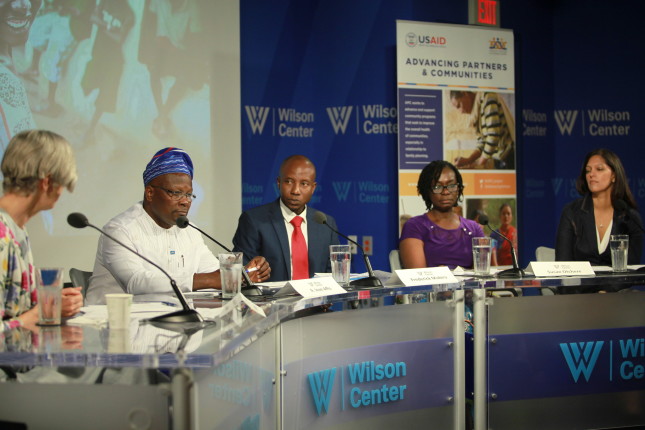-
Attitudes, Hotspots, and Role Models: Promoting Family Planning in Rural Communities
May 17, 2019 By Elizabeth Wang
“Strengthening community health is critical to expanding voluntary family planning,” said A. Jean Affo, Chief of Party at Advancing Partners & Communities (APC) Benin at a recent Wilson Center event on the importance of community health systems to the sustainable development and stability of countries. In Benin, around half of the population lives in rural areas with a lack of access to quality healthcare services and information. Traditional attitudes and gender norms prevent women and couples from utilizing family planning methods, said Affo. Combined with early marriage, inadequate family planning leaves women and girls vulnerable to health issues associated with inadequate timing and spacing between pregnancies.
In the Agago District of Uganda, family planning is further complicated by the destabilizing effects of conflict in nearby Sudan. Frederick Mubiru, Chief of Party at APC Uganda, discussed the value of fertility hotspot mapping, an epidemiological analysis which identifies areas where fertility rates are highest. Mapping these “hotspots” allows organizations to dig deeper into community-specific behaviors and create tailored interventions, said Mubiru. For example, APC Uganda specifically mapped areas where adolescent pregnancy is particularly prevalent and aimed to determine which socio-cultural factors contributed to these rates.
Panelists agreed that practicing cultural sensitivity and a community-based approach are key when promoting uptake of family planning in various communities. This means getting not only women but also men, teachers, religious leaders, and other community leaders involved. In Agago, APC implemented an intervention called “Emanzi,” which means male role model. “It’s an approach that takes [men] through a nine-week curriculum that addresses gender issues but also teaches couples communication and joint decision-making,” said Mubiru.
A community-based approach to promoting family planning must reflect a strong understanding of the area population, said Susan Otchere, Senior Technical Advisor of Family Planning and Reproductive Health, Birth Spacing and Advocacy at World Vision, who has worked on family planning and maternal and child health. In Garba Tula, Kenya, she said, communities tend to be nomadic pastoralists who are predominantly Muslim.
With that knowledge, World Vision realized that the community responded more positively to the terminology “birth spacing” than “family planning,” because it was more closely aligned with the Quran’s teachings to keep women healthy by spacing births and allowing for breastfeeding, said Otchere. Sensitivity to these nuances, she said, allowed the team to gain the trust of the community.
Moving forward, countries that wish to develop sustainably must make strengthening community health systems a priority. Increasing local financing will be crucial to sustaining community health programs, said Affo. But the next call to action, said Otchere, is to integrate food security with health programs. “I see this as a community’s journey to self-reliance,” she said.
Sources: Advancing Partners & Communities, United Nations Population Fund, World Health Organization, World Vision.
Friday Podcasts are also available for download on iTunes and Google Podcasts.
Topics: development, Dot-Mom, family planning, featured, Friday Podcasts, global health, health systems, media, podcast
 A Publication of the Stimson Center.
A Publication of the Stimson Center.



